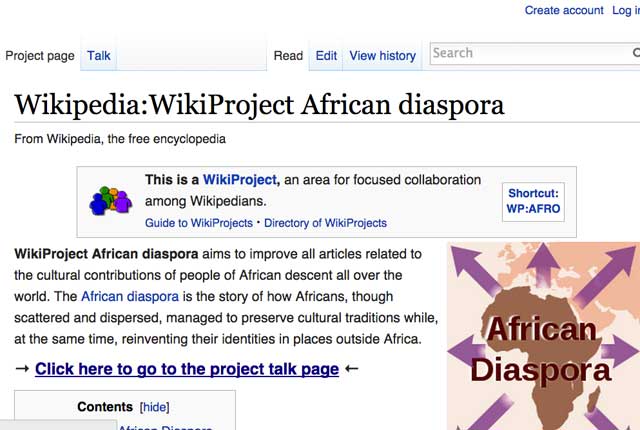This coming weekend, in honor of Black History Month, modern-day griots of black history and cultures are holding Wikipedia editing meet-ups to diversify the site’s pool of volunteer editors and add more content about the African diaspora.
There is certainly a demand: Of the more than 100 million edits made last year to Wikipedia, Ferguson protests ranked among the most edited topic. In 2013, "race and intelligence" was one of the top 10 most controversial articles–ahead of Christianity–on the English-language version of the site. And the person most likely involved not only in global edit wars over race and racism but in the daily drip of crowd-sourced Wiki knowledge is a "technically inclined white male."
Khalil Muhammad, director of the Schomburg Center for Research in Black Culture, calls Wikipedia a vital resource. "[Wikipedia] is for [millennials], the source of information that they go to," Muhammad recently told Huff Post Live. "Therefore, if they are looking up Ida B. Wells and Ida B. Wells isn’t there, then Ida B. Wells doesn’t count."
A household name to anyone with Internet access, Wikipedia, a project of the nonprofit Wikimedia, is the sixth-largest website in the world. Over the past 14 years, according to the all-things-digital site Mashable, it "has re-shaped the knowledge industry." Who doesn’t read a Wiki entry at least once a week? Even Maira Liriano, associate chief librarian in the Schomburg’s research and reference division browses it. And that’s "usually when I discover that something is missing," she says via e-mail.
Established articles on, say, Dr. Martin Luther King Jr. or Langston Hughes don’t worry Liriano; "those entries get edited constantly," she says. But in addition to those who’re simply absent, Liriano says, "I’m more concerned about lesser-known figures that get shortchanged by brief and incomplete entries, people like Lawrence D. Reddick, King’s first biographer and the second Schomburg curator, or Aaron Douglas, the leading painter of the Harlem Renaissance."
Wikipedia doesn’t track frequent contributors by race. But, "it’s a known fact inside our movement that black people are not well represented within the Wiki community," says longtime editor Milos Rancic via e-mail from Serbia. (Indeed, Wikipedia has a detailed "systemic bias" article on its demographics.) Rancic, a former president of Wikimedia Serbia, one of the organization’s early chapters, has volunteered with Wikimedia for 11 of its 14 years in existence.
"If the situation wasn’t so striking, I wouldn’t recognize it as a problem," says Rancic who has consistently noted the lack of black editors–African-Americans in particular–at annual global Wikimedia events and hackathons. The dearth of black American editors is particularly striking given that the United States is Wikimedia’s top source of private donations–$24.5 million in 2012 compared to just $2 million from the No. 2 donor, the United Kingdom. And nearly 20 percent of page edits originate in the United States, three times more than the U.K., the second country on the list.
Several "editathons"–a Wiki world phenomenon of unrelated editor meet-ups that began in 2009–are scheduled for this weekend. Rancic came together with AfroCrowd’s Alice Backer to launch a Black WikiHistory Editathon at Brooklyn Public Libraries. The Schomburg’s Black Lives Matter Editathon for amateur documentarians of black history and culture has reached capacity. Others are also planned for Nashville and Washington, D.C. Backer’s Brooklyn Library event appears to have a global black diaspora bent, in particular.
For Backer, a central aim of the project is to give people of color opportunities to do more than participate in and consume social media. She wants people of color to create and interact with the technology itself.
"This exposure, especially with the younger folks, could inspire some to take a closer look at STEM in the long run," she says.
Librarian Liriana has a wish list of Wikipedia entries she’d like to see added to or improved this month. They include unsung figures such as dancer and educator, Dr. Glory Van Scott, Violette Neatly Anderson, the first black woman lawyer to argue a case before the U.S. Supreme Court, South African political prisoner Molefe Pheto and novelist Charles A. Smythwick, who wrote a critically acclaimed novel in 1954 but then disappeared.
Like Black Twitter, "it would be great to have a "Black Wikipedia" phenomenon," Liriano says. "Perhaps it will become the next big thing."
